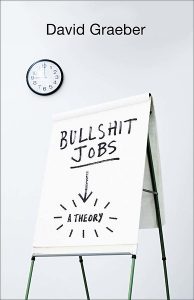In the new book How Art Works, Ellen Winner walks us through the foundations of how we think about art, touching on questions, research, and theory.
Bullshit Jobs: David Graeber’s Theory on the Open Secret of Work
 The promise of technological advancement is relatively simple: we create technology to make our work easier, therefore, these advancements will cause a reduction in our work. That is, people will either work less, or be put out of work by those advancements. In 1930, for example, John Maynard Keynes famously predicted that these advancements would achieve for workers a 15-hour work week. This obviously did not happen. However, in his new book Bullshit Jobs: A Theory, David Graeber suggests that, “Automation did, in fact, lead to mass unemployment. We have simply stopped the gap by adding dummy jobs that are effectively made up.”
The promise of technological advancement is relatively simple: we create technology to make our work easier, therefore, these advancements will cause a reduction in our work. That is, people will either work less, or be put out of work by those advancements. In 1930, for example, John Maynard Keynes famously predicted that these advancements would achieve for workers a 15-hour work week. This obviously did not happen. However, in his new book Bullshit Jobs: A Theory, David Graeber suggests that, “Automation did, in fact, lead to mass unemployment. We have simply stopped the gap by adding dummy jobs that are effectively made up.”
Much of the modern world we know is made of abstractions. Take money, for example, or the economy at large, or corporate law, or marketing. These are abstractions that we are so accustomed to that we tend to think of them as “real,” and it’s exactly this effort of treating them as real that they become so. It’s also, however, a quality that makes it harder to discern what is real and what is not. When it comes to “bullshit jobs,” Graeber starts by defining his terms: “a bullshit job is a form of paid employment that is so completely pointless, unnecessary, or pernicious that even the employee cannot justify its existence even though, as part of the conditions of employment, the employee feels obliged to pretend that this is not the case.” In other words, a bullshit job is one in which the person performing the job can only hang her head and say in soul-deflated agony, “This is such bullshit.”
This contrasts, it must be said, with a “shit job,” which may be miserable and unwanted but still provides to society some value, even negative.
Graeber’s book comes at the heels of an article he wrote in 2013, “On the Phenomenon of Bullshit Jobs,” which went viral and resonated with so many people that he began to receive people’s stories of their own bullshit jobs. This began his research into the matter, the result of which led him to discern five kinds of bullshit jobs: flunkies, goons, duct tapers, box tickers, and task masters.
Yet, far beyond just pointing his finger to the phenomenon of bullshit jobs, Graeber then goes on to ask the hard questions of the matter: how did we get here, how has it been enabled to flourish, why do we allow ourselves to live like this, and is there another way?

Graeber makes the case that many bullshit jobs in fact reinforce the systems that created them. For example, “flunkies” are given jobs for not much more of a reason than to increase the status of the person who hired them; in modern parlance, we could say that the higher your FTE count, the more important you must be in the organization, the higher your budget, the greater your responsibilities, etc. All of this says nothing about those hirelings being useful aside from the fact of their warm bodies sitting in a workplace, which they often perceive, to their own “spiritual violence.” Yet, because of the comfort of a steady paycheck, because of the internalization of the philosophy that “dutiful submission even to meaningless work under another’s authority is a form of moral self-discipline that makes you a better person,” because the jobless are often treated as a scourge of society… we all participate in the scheme of shared deception. Employees pretend to work and to believe that their work matters, and employers, sometimes whole organizations and societies, play along.

Graeber gives the numbers: In a survey of Britons for example, in response to the question “Does your job make a meaningful contribution to the world?” only around 50% believed that it did; 13% were uncertain while a full 37% said they believed it did not. Dutch workers were a little worse off, with around 40% reporting that their jobs had no good reason to exist. As I was reading this, I recalled with fascination the 2003 TED talk of Deborah Gordon, The Emergent Genius of Ant Colonies, in which she says: “Curiously, and interestingly, it looks as though at any time about half the ants in the colony are just doing nothing.” She then asks, in a way that’s nearly identical to Graeber’s later musings on human society, “What is there about the way the colony is organized that might give some function to a reserve of ants who are doing nothing?” Perhaps it’s because she takes the position of one species studying another that her question is not rhetorical, but one enabled to answer with confidence: “They sort of stand as a buffer in between the ants working deep inside the nest and the ants working outside.”
I can’t help but wonder if some ants accuse other ants of being lazy. I can’t help but wonder what those ants would do if they had our deep sense of shame at being unemployed, or if they felt in their soul the pointlessness of “doing nothing.”
Graeber writes that Marx appears to have been right when he argued that “a ‘reserve army of the unemployed’ has to exist in order for capitalism to work the way it’s supposed to.” Yet, despite this, and despite the fact that our productivity overall is well accounted for, and despite the fact that many forms of labor (like child care) are not even considered jobs, there is apparently a need to keep unemployment numbers low, even if that means assigning people to jobs that do not fulfill them personally or add to society in a meaningful way. “How have so many humans reached the point,” Graeber asks, “where they accept that even miserable, unnecessary work is actually morally superior to no work at all?”

As automation continues, and as technological advancements proceed to solve problems both wide and deep, it is a matter worth bringing to the front and center of economic and social policy. Graeber insists that we must disabuse ourselves of the myth that all people are just looking for a way to escape work, and if nothing is required of them then they will do nothing. On the contrary, once we are each freed from the obligations of enforced labor, we may very well be able to, as Aristotle suggested, “fulfill one’s social and political obligations.” Generally speaking, people want to work, they want to fulfill their potential and be of value to their families and communities. It’s just that, we’ve gotten so systematically dysfunctional that we believe that our best way of achieving that is by working hard for something that we don’t enjoy and which brings no value to society, just because it’s called “employment.”
Research on work, as analyzed and presented by Graeber, arrives at two conclusions:
- Most people’s sense of dignity and self-worth is caught up in working for a living.
- Most people hate their jobs.
Now, while “the glory of the worker” and a “love of one’s work” can be easily exploited and, if you’ll excuse the phrasing, capitalized on by communist ideologies, it bears reminding that this only becomes a problem when a person doesn’t own the fruits of his labor. It speaks to the extent that we’ve let ourselves get worked over by the system that we participate in such normalized masochism. The solution is probably to be found by addressing both concerns, and finding other sources of dignity and self-worth, as well as reconnecting with our own labor in a meaningful and self-profiting way. Graeber suggests that we need to find ways of decoupling work from livelihood entirely, and I’m inclined to agree.
Ultimately, Bullshit Jobs is a thorough and passionate deconstruction of our contemporary relationship to work and wages, and the lengths we will go to as individuals and as a society to keep up the illusion that a job, despite its form or value, is in and of itself a moral good. It is a book of deeply important matter.
 Bullshit Jobs is published by Allen Lane, a Penguin imprint. This review was published by the American Book Center in Amsterdam, The Netherlands.
Bullshit Jobs is published by Allen Lane, a Penguin imprint. This review was published by the American Book Center in Amsterdam, The Netherlands.



